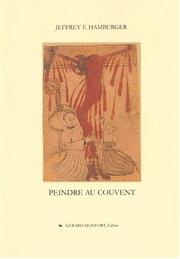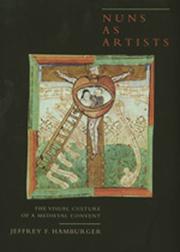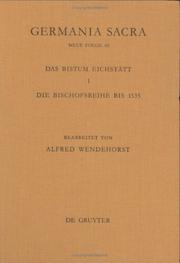| Listing 1 - 5 of 5 |
Sort by
|

ISBN: 2852264889 9782852264885 Year: 2000 Publisher: Paris Gérard Monfort
Abstract | Keywords | Export | Availability | Bookmark
 Loading...
Loading...Choose an application
- Reference Manager
- EndNote
- RefWorks (Direct export to RefWorks)
Dans cette étude pionnière sur l'art dans les couvents féminins, Jeffrey F. Hamburger étudie la fonction des images et de leur fabrication dans la spiritualité les religieuses à la fin du Moyen Age. Fondée sur un groupe extraordinaire et jusqu'ici inconnu de dessins dévotionnels réalisés par une religieuse bénédictine pour ses compagnes cloîtrées, son étude dégage avec une précision sans précédent les traits caractéristiques de la culture visuelle des communautés féminines. Les dessins découverts par Hamburger et le genre auquel ils appartiennent n'ont jamais retenu sérieusement l'attention des historiens de l'art ils constituent pourtant les icônes de la vocation religieuse féminine dans toute sa complexité. Situant ces dessins et les images qui leur sont liées - enluminures, gravures, tapisseries, objets d'orfèvrerie - dans le contexte de la vie et de la réforme religieuses en Allemagne à la fin du Moyen Age, le livre de Jeffrey F. Hamburger reconstruitt les traditions artistiques, littéraires et instututionnelles qui donnaient sa forme à la vie des femmes cloîtrées.En éclairant les schémas et les protocoles de regard qui gouvernaient la vie dévotionnelle et liturgique des religieuses Jeffrey E Hamburger établit de façon convaincante l'importance considérable qu'avait l'acte de voir dans la pratique dévotionnelle. Il met ainsi en question les affirmations traditionnelles selon lesquelles le texte était plus important que l'image dans la piété monastique. Son analyse de la culture visuelle du couvent apporte une contribution fondamentale à l'histoire de l'art médiéval et, d'une façon plus large, à l'histoire de la vie monastique et de la spiritualité médiévales tardives.
Devotional objects --- Christian art and symbolism --- Nuns as artists --- Objets de dévotion --- Art et symbolisme chrétiens --- Religieuses artistes --- Catholic Church --- Eglise catholique --- Benediktinerinnen-Abtei St. Walburg (Eichstätt, Germany) --- Objets de dévotion --- Art et symbolisme chrétiens --- Benediktinerinnen-Abtei St. Walburg (Eichstätt, Germany) --- Benediktinerinnenabtei St. Walburg (Eichstätt, Germany) --- 246 --- 726.71 --- 726.71 Christelijke kloosters en abdijen --- Christelijke kloosters en abdijen --- 246 Art et symbolisme chretiens --- 246 Christelijke kunst en symbolisme --- Art et symbolisme chretiens --- Christelijke kunst en symbolisme --- Devotional objects - Germany - Eichstätt --- Devotional objects - Catholic Church --- Christian art and symbolism - Germany - Eichstätt - Medieval, 500-1500 --- Nuns as artists - Germany - Eichstätt

ISBN: 0520917375 0585108676 9780520917378 9780585108674 9780520203860 0520203860 Year: 1997 Publisher: Berkeley : University of California Press,
Abstract | Keywords | Export | Availability | Bookmark
 Loading...
Loading...Choose an application
- Reference Manager
- EndNote
- RefWorks (Direct export to RefWorks)
Jeffrey F. Hamburger's groundbreaking study of the art of female monasticism explores the place of images and image-making in the spirituality of medieval nuns during the later Middle Ages. Working from a previously unknown group of late-fifteenth-century devotional drawings made by a Benedictine nun for her cloistered companions, Hamburger discusses the distinctive visual culture of female communities. The drawings discovered by Hamburger and the genre to which they belong have never been given serious consideration by art historians, yet they serve as icons of the nuns' religious vocation in all its complexity. Setting the drawings and related imagery-manuscript illumination, prints, textiles, and metalwork-within the context of religious life and reform in late medieval Germany, Hamburger reconstructs the artistic, literary, and institutional traditions that shaped the lives of cloistered women.Hamburger convincingly demonstrates the overwhelming importance of "seeing" in devotional practice, challenging traditional assumptions about the primacy of text over image in monastic piety. His presentation of the "visual culture of the convent" makes a fundamental contribution to the history of medieval art and, more generally, of late medieval monasticism and spirituality.
Christian art and symbolism --- Devotional objects --- Nuns as artists --- Visual Arts --- Art, Architecture & Applied Arts --- Decorative Arts --- Women artists --- Art, Christian --- Art, Ecclesiastical --- Arts in the church --- Christian symbolism --- Ecclesiastical art --- Symbolism and Christian art --- Religious art --- Symbolism --- Symbolism in art --- Church decoration and ornament --- Religious articles --- Sacramentals --- Liturgical objects --- Catholic Church. --- Catholic Church --- Benediktinerinnenabtei St. Walburg (Eichstätt, Germany) --- Benediktinerinnen-Abtei St. Walburg (Eichstätt, Germany) --- Benediktinerinnen-Abtei Sankt Walburg (Eichstätt, Germany) --- Benediktinerinnenkloster zu Eichstätt (Eichstätt, Germany) --- Benediktinerinnenkloster St. Walburg zu Eichstätt (Eichstätt, Germany) --- Benediktinerinnenabtei St. Walburga (Eichstätt, Germany) --- Kloster St. Walburg (Eichstätt, Germany) --- Abtei St. Walburg (Eichstätt, Germany) --- Eichstätt (Germany). --- Nuns as artists.
Book
ISBN: 3447042508 9783447042505 Year: 2000 Volume: 45 Publisher: Wiesbaden Harrasowitz
Abstract | Keywords | Export | Availability | Bookmark
 Loading...
Loading...Choose an application
- Reference Manager
- EndNote
- RefWorks (Direct export to RefWorks)
Libraries
---
Benediktinerinnen-Abtei St Walburg (Eichstätt, Germany)
---
094.2 <43 EICHSTATT>
---
271.1 <43 EICHSTATT>
---
026 <43 EICHSTATT>
---
-Documentation
---
Public institutions
---
Librarians
---
Oude drukken: bibliotheekcatalogi--

ISSN: 04355857 ISBN: 9783110189711 3110189712 9783110596403 3110596407 9783110598704 9783110594485 Year: 2006 Volume: 15 Publisher: Berlin de Gruyter
Abstract | Keywords | Export | Availability | Bookmark
 Loading...
Loading...Choose an application
- Reference Manager
- EndNote
- RefWorks (Direct export to RefWorks)
Die Benediktinerinnenabtei St. Walburg wurde im Jahre 1035 durch Graf Leodegar von Graisbach-Lechsgemünd am Grab der hl. Walburga in Eichstätt gegründet. Der Walburgakult nahm durch alle Jahrhunderte stets eine zentrale Stellung im Leben der Benediktinerinnen dieses Klosters ein, dessen Bedeutung insbesondere in seiner Eigenschaft als vielbesuchte Wallfahrtstätte begründet ist. In der Mitte des 15. Jahrhunderts wurde die Abtei durch den Eichstätter Bischof Johann von Eych reformiert. Nach der Erholung von den im Dreißigjährigen Krieg erlittenen Schäden folgte im 18. Jahrhundert eine wirtschaftliche und kulturelle Blütezeit. Dem Umstand, dass die Nonnen sich nach der Säkularisierung 1806 nicht vertreiben ließen und 1835 die Wiedererrichtung durch König Ludwig I. von Bayern erlebten, ist zu es verdanken, dass ein Großteil der Archivalien und der Kunstschätze im Kloster erhalten blieb. Dem Schema der Germania Sacra folgend wird ein Großteil der Quellen zur Geschichte des Klosters ausgewertet. Das Werk enthält einen ausführlichen Besitzkatalog sowie umfangreiche Listen der Angehörigen des Klosters.
Christian church history --- Eichstätt --- Bishops --- Evêques --- History --- Histoire --- Catholic Church. --- Eichstätt (Germany) --- Eichstätt (Allemagne) --- Church history --- Histoire religieuse --- Catholic Church --- Eichstätt (Germany) --- 271 <43 EICHSTATT> --- Kloosterwezen. Religieuze orden en congregaties. Monachisme--Duitsland voor 1945 en na 1989--EICHSTATT> --- Sources --- History. --- Evêques --- Eichstätt (Allemagne) --- Archbishops --- Clergy --- Major orders --- Metropolitans --- Orders, Major --- Chaplains, Bishops' --- Episcopacy --- Eichstätt (Diocese) --- Eichstätt (Germany : Diocese : Catholic Church) --- Bistum Eichstätt --- Diözese Eichstätt --- Church history. --- Benedictine monasteries --- Benediktinerinnen-Abtei St. Walburg (Eichstätt, Germany) --- Benedictines --- Benediktinerinnenabtei St. Walburg (Eichstätt, Germany) --- St. Walburg (Benedictine Abbey) --- Benedictine nuns --- Benediktinerinnenabtei St. Walburg (Eichstätt, Germany). --- 271.1 <43 EICHSTATT> --- 271.1 <43 EICHSTATT> Benedictijnen--Duitsland voor 1945 en na 1989--EICHSTATT --- Benedictijnen--Duitsland voor 1945 en na 1989--EICHSTATT --- Christelijke kerkgeschiedenis --- Benediktijnen --- Mainz --- Bishops - Germany - Eichstätt - History --- Eichstätt (Germany) - Church history --- St. Walburg (Eichstätt)

ISBN: 0520203860 9780520203860 Year: 1997 Volume: 37 Publisher: Berkeley University of California press
Abstract | Keywords | Export | Availability | Bookmark
 Loading...
Loading...Choose an application
- Reference Manager
- EndNote
- RefWorks (Direct export to RefWorks)
Jeffrey F. Hamburger's groundbreaking study of the art of female monasticism explores the place of images and image-making in the spiritually of medieval nuns during the later Middle Ages. Working from an extraordinary and previously unknown group of devotional drawings made by a Benedictine nun for her cloistered companions, Hamburger discusses in unprecedented detail the distinctive visual culture of female communities. Hamburger's book reconstructs the artistic, literary, and institutional traditions that shaped the lives of cloistered women. In illuminating the patterns and protocols of viewing that governed the nuns' devotional and liturgical life, Hamburger convincingly demonstrates the overwhelming importance of "seeing" in devotional practice, challenging traditional assumptions about the primacy of text over image in monastic piety. His presentation of the "visual culture of the convent" makes a fundamental contribution to the history of medieval art and more generally, of late medieval monasticism and spirituality. The drawings discovered by Hamburger and the genre to which they belong have never been given serious consideration by art historians, yet they serve as icons of the nuns' religious vocation in all its complexity. Setting the drawings and related imagery - manuscript illumination, prints, textiles, and metalwork - within the context of religious life and reform in late medieval Germany.
091 <43 EICHSTATT> --- 091.31:7.04 --- 091.31 <43> --- 271-055.2 "04/14" --- 769.4 --- Devotional objects --- Nuns as artists --- -Christian art and symbolism --- -Religious articles --- Sacramentals --- Liturgical objects --- 769.4 Prentenverzamelingen: doodsprentjes; santjes; bidprentjes; devotieprentjes --- Prentenverzamelingen: doodsprentjes; santjes; bidprentjes; devotieprentjes --- 091.31:7.04 Verluchte handschriften: iconografie --- Verluchte handschriften: iconografie --- Art, Christian --- Art, Ecclesiastical --- Arts in the church --- Christian symbolism --- Ecclesiastical art --- Religious art, Christian --- Sacred art --- Symbolism and Christian art --- Art --- Symbolism --- Christian antiquities --- Church decoration and ornament --- Women artists --- 271-055.2 "04/14" Vrouwelijke religieuze orden, congregaties--Middeleeuwen --- Vrouwelijke religieuze orden, congregaties--Middeleeuwen --- 091.31 <43> Verluchte handschriften--Duitsland voor 1945 en na 1989 --- Verluchte handschriften--Duitsland voor 1945 en na 1989 --- 091 <43 EICHSTATT> Handschriftenkunde. Handschriftencatalogi--Duitsland voor 1945 en na 1989--EICHSTATT --- Handschriftenkunde. Handschriftencatalogi--Duitsland voor 1945 en na 1989--EICHSTATT --- Catholic Church. --- Benediktinerinnen-Abtei St. Walburg (Eichstätt, Germany) --- Eichstätt (Germany). --- Benediktinerinnen-Abtei Sankt Walburg (Eichstätt, Germany) --- Benediktinerinnenkloster zu Eichstätt (Germany) --- Benediktinerinnenkloster St. Walburg zu Eichstätt (Germany) --- Klosterkirche St. Walburg (Eichstätt, Germany) --- Benediktinerinnenabtei St. Walburga (Eichstätt, Germany) --- St. Walburg (Church : Eichstätt, Germany) --- Abteikirche St. Walburg (Eichstätt, Germany) --- History of civilization --- Christian religious orders --- Christian special devotions --- anno 500-1499 --- Germany --- Beeldcultuur. --- Christian art and symbolism --- Kunst. --- Künstlerin. --- Nonne. --- Nonnen. --- Objets liturgiques --- Religieuses --- Religieuze kunst. --- Vie religieuse et monastique --- Église catholique --- Abtei Sankt Walburg (Eichstätt, Allemagne). --- Benediktinerinnen-Abtei St. Walburg (Eichstätt, Germany). --- -769.4 Prentenverzamelingen: doodsprentjes; santjes; bidprentjes; devotieprentjes --- Art et symbolisme chrétiens --- Objets de dévotion --- Religieuses artistes --- Catholic Church --- Eglise catholique --- Benediktinerinnen-Abtei St. Walburg (Eichstätt, Germany) --- Religious art --- Religious articles --- Benediktinerinnenabtei St. Walburg (Eichstätt, Germany) --- Benediktinerinnenkloster zu Eichstätt (Eichstätt, Germany) --- Benediktinerinnenkloster St. Walburg zu Eichstätt (Eichstätt, Germany) --- Kloster St. Walburg (Eichstätt, Germany) --- Abtei St. Walburg (Eichstätt, Germany) --- Eichstätt --- Medieval, 500-1500 --- Benedictine nuns --- Abtei St. Walburg (Eichstätt, Germany) --- Devotional objects - Germany - Eichstèatt. --- Devotional objects - Catholic Church. --- Christian art and symbolism - Medieval, 500-1500 - Germany - Eichstèatt. --- Nuns as artists - Germany - Eichstèatt. --- Christelijke bijzondere devoties --- Christelijke religieuze orden --- Cultuurgeschiedenis --- Duitsland --- Middle Ages, 500-1500 --- Symbolism in art
| Listing 1 - 5 of 5 |
Sort by
|

 Search
Search Feedback
Feedback About UniCat
About UniCat  Help
Help News
News